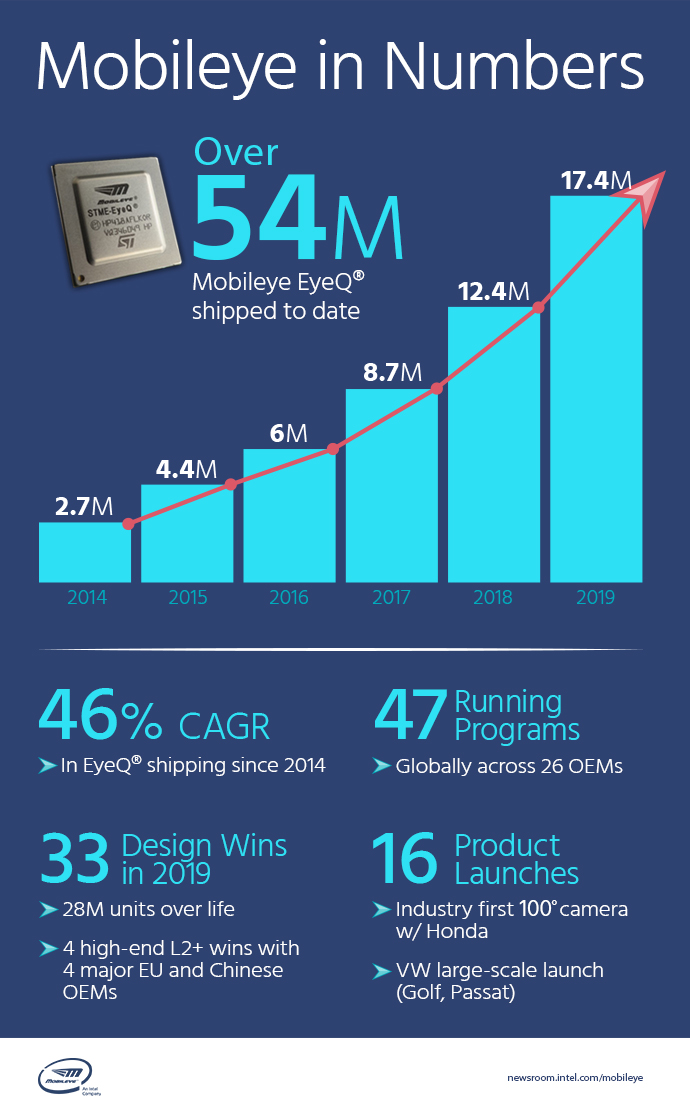Equipped with a business strategy unlike any other automotive supplier and growth ambitions to become a complete mobility provider, Mobileye President and CEO Prof. Amnon Shashua called on the industry to be transparent with its autonomous driving technology and then showed a 23-minute unedited, uninterrupted drive of an autonomous vehicle (AV) using camera-only sensors.
More: All Mobileye and Intel News from CES 2020 | Mobileye News | Mobileye’s Computer Vision (Event Replay) | Autonomous Driving at Intel
During his annual CES address, Shashua provided an under-the-hood tour of Mobileye’s leading computer vision technology, showed how the company’s mapping strategy is helping the company achieve global scale, and introduced new deals for advanced driver-assistance systems (ADAS) and driverless mobility-as-a-service (Maas). Scroll down for a synopsis of Mobileye’s updates from #CES2020.
Under the Hood with Mobileye: In his annual CES address, Intel Senior Vice President and Mobileye CEO Prof. Amnon Shashua called for more transparency in technology to enable the future of autonomous driving. In front of a captivated audience in Las Vegas, Shashua went under the hood of Mobileye’s computer vision, presenting new details behind the company’s latest technology advancements to demonstrate the innovative approach it is taking to make autonomy a reality. For the first time, Shashua discussed “VIDAR,” Mobileye’s unique solution for achieving outputs akin to lidar using only camera sensors. In addition, he detailed how Mobileye achieves pixel-level scene segmentation that can be used to detect tiny fragments of road users such as wheelchairs, open vehicle doors and more, as well as the ways in which Mobileye technology turns two-dimensional sensors into 3D understanding. Highlighting the progress and purpose of Mobileye’s drive to full autonomy, Shashua’s address showcased exactly how the company will lead the industry in realizing autonomous driving. » Watch full presentation | » Download speaker presentation
Camera-Driven AV Navigates Jerusalem: Mobileye is developing two truly redundant sensing systems: one with surround-view cameras alone and the other with radars and lidars. In this unedited video demonstrating the camera-only technology in Jerusalem, you can see Mobileye’s car successfully navigate a complex driving environment heavy with pedestrians, unguarded intersections, delivery vehicles and more. This is the everyday capability of Mobileye’s technology. » Watch video on YouTube
Mobileye in Numbers: At CES 2020, Mobileye revealed new growth metrics demonstrating the continued strength of Intel’s fastest-growing business, including more than 54 million EyeQ chips shipped to date. 2019 was another record year for the company, with sales close to $1 billion driven by significant growth in the ADAS market. Mobileye’s future business is expanding greatly with forays into data monetization and the nascent robotaxi market. » Click for full-size infographic
Mobileye Maps Las Vegas: Using its crowd-sourced Road Experience Management™ (REM™) technology, Mobileye created a demonstration high-definition map of more than 400 km (248 miles) of Las Vegas roads from over 16,000 drives. Map creation of Nevada-area roads took less than 24 hours. This map provides centimeter-level accuracy for thousands of on-road and near-road objects, including 60,000 signs, 20,000 poles and more than 1,500 km of lane centerlines. The near-real-time capability of REM coupled with the extremely low-bandwidth data upload (approximately 10 kilobits/km) from millions of Mobileye-equipped passenger cars makes this technology highly scalable and practical for both advanced ADAS (L2+) solutions and full AVs including driverless mobility-as-a-service (MaaS) fleets. » Download video: “2020 CES: Mobileye Maps Las Vegas (B-Roll)”
Mobileye in China: Mobileye announced a new agreement with SAIC, a leading Chinese OEM to use Mobileye’s REM mapping technology to map China for L2+ ADAS deployment while paving the way for autonomous vehicles in the country. The deployment of the mapping solution in China presents opportunities for additional OEM partners to enter the Chinese market with map-related features. China is the first country to benefit from the four Mobileye strategic product categories. With the addition of the SAIC agreement, Mobileye’s China footprint now includes L2+ ADAS, mapping (a first for China), MaaS and consumer AVs. Caption: Professor Amnon Shashua speaks at CES on Tuesday, Jan. 7, 2020. (Credit: Walden Kirsch/Intel Corporation) » Click for full image
Mobileye Expands Driverless to South Korea: Mobileye and the leaders of Daegu Metropolitan City, South Korea, announced an agreement to establish a long-term cooperation to test and deploy robotaxi-based mobility solutions powered by Mobileye’s autonomous vehicle technology. Mobileye will integrate its industry-leading self-driving system into vehicles to enable a driverless MaaS operation. The agreement with Daegu City, one of South Korea’s largest metropolitan areas, extends Mobileye’s global MaaS footprint. Combined with Mobileye’s previously announced robotaxi-based mobility services agreements, the new deal shows how Mobileye is quickly scaling its autonomous MaaS ambitions globally. Caption: Jack Weast, Mobileye vice president and Intel senior principal engineer, gives a tour of the Mobileye booth at CES 2020. (Credit: Walden Kirsch/Intel Corporation) » Click for full image



